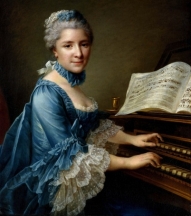CHARLOTTE-ROSE DE CAUMONT DE LA FORCE

Charlotte-Rose de Caumont de La Force (c. 1650–1724), known as Mademoiselle de La Force, was a French novelist and poet. The younger of two sisters, she was born to an aristocratic family, one of France’s oldest and most esteemed. Her parents were devout Huguenots. Her father, who was the seventh son of the Duc de La Force, died when she was a baby, and her mother, who was a second cousin to King Louis XIV, was imprisoned in a convent when La Force was an adolescent. La Force and her sister Marie became wards of the King when their mother died in the convent, and at the age of 16, La Force was summoned to serve as a lady-in-waiting to the Dauphine, Queen Marie-Therese. She converted to Catholicism in 1686 and received a pension from the King.
La Force scandalised the court with her behaviour, which included being involved in numerous intrigues and love affairs. In 1687, she had a clandestine love affair with a much younger man, Charles Briou, the son of the president of Parliament. They eloped, but his father intervened to have the marriage annulled (even though they had obtained the King’s permission to marry and had married a month after Briou turned 25, which was the legal age of consent). Impoverished by the charge she was forced to pay, La Force turned to writing.
La Force was an active participant in the Parisian literary salons of the 17th century, where it was the fashion to create fairytales for the nobility. Her contemporary storytellers included Henriette-Julie de Murat, Marie Catherine d’Aulnoy, Marie-Jeanne Lhéritier, and Charles Perrault. She wrote popular short stories and novels, which included a series of histoires secretes—novellas recounting the ‘secret history’ of a famous person, such as Margaret of Valois and Henry VI of Castile.
In 1697, due to gossip and scandalous rumours about her, the King gave La Force the choice of exile (and the risk of losing her pension) or a convent. She chose the convent, where she spent over a decade. While there, she completed her best known work: ‘Les Contes des Contes’ (1697), a collection of fairy tales that included ‘Persinette,’ ‘Fairer than a Fairy,’ and ‘The Good Woman.’ It was published under the pseudonym “Mademoiselle de X.” Earnings from her writing secured her freedom, though not a return to court. She moved to Paris until her death in 1724, aged 74.
Available Titles by Charlotte-Rose de Caumont de La Force:

